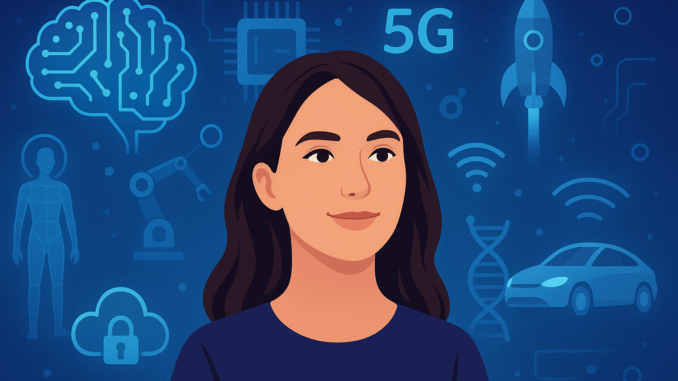
Top 10 Emerging Technologies Shaping the Future of Innovation in 2025
Technology continues to evolve at lightning speed, reshaping industries, societies, and even the way we live our daily lives. From artificial intelligence to biotechnology, the world is entering a new era where emerging technologies are not only solving existing challenges but also unlocking opportunities that once seemed impossible.
As we step into 2025, it’s essential to understand the technologies driving this transformation. In this article, we’ll explore the top 10 emerging technologies shaping the future of innovation in 2025, their potential applications, and their impact on businesses, governments, and individuals.
1. Artificial Intelligence (AI) and Machine Learning (ML)
Artificial Intelligence is not new, but in 2025, its capabilities are expanding exponentially. AI is now being integrated into healthcare, finance, education, and customer service at a scale never seen before.
- Key Innovations: AI-driven chatbots, autonomous decision-making, generative AI tools, and personalized recommendations.
- Impact: Businesses can automate repetitive tasks, improve efficiency, and deliver better customer experiences. In healthcare, AI assists in diagnostics and treatment planning.
AI is shaping a future where machines don’t just assist humans but actively collaborate with them.
2. Quantum Computing
Quantum computing is moving beyond theory into real-world applications. Unlike classical computers, quantum systems can perform calculations at speeds previously unimaginable.
- Key Innovations: Quantum cryptography for data security, drug discovery, and financial modeling.
- Impact: Industries dealing with big data—such as banking, climate science, and logistics—will be transformed.
By 2025, tech giants and startups are racing to make quantum computing accessible for solving complex global challenges.
3. 5G and Beyond (6G Development)
The rollout of 5G networks has already revolutionized mobile connectivity, but in 2025, 6G research is also taking shape. Faster internet speeds mean more opportunities for advanced digital services.
- Key Innovations: Real-time remote surgeries, self-driving cars, augmented reality (AR), and Internet of Things (IoT) ecosystems.
- Impact: Faster and more reliable communication boosts business productivity and enhances global connectivity.
5G is the backbone of innovations like smart cities, autonomous vehicles, and immersive entertainment experiences.
4. Extended Reality (XR): AR, VR, and MR
The future of digital experiences lies in Extended Reality (XR), which combines Augmented Reality (AR), Virtual Reality (VR), and Mixed Reality (MR).
- Key Innovations: Virtual classrooms, 3D simulations for training, AR-enhanced shopping, and virtual tourism.
- Impact: Industries such as gaming, education, and real estate are adopting XR for better engagement. Remote collaboration in immersive virtual environments is becoming mainstream.
In 2025, XR will redefine how we interact, learn, and even socialize.
5. Blockchain and Decentralized Systems
Blockchain has evolved from powering cryptocurrencies to becoming a pillar of trust in digital transactions.
- Key Innovations: Decentralized finance (DeFi), non-fungible tokens (NFTs), supply chain tracking, and secure voting systems.
- Impact: It enhances transparency, reduces fraud, and allows secure peer-to-peer transactions.
By 2025, blockchain will support industries beyond finance, from healthcare records management to global trade logistics.
6. Biotechnology and Gene Editing
The convergence of technology and biology is paving the way for groundbreaking medical solutions. Tools like CRISPR-Cas9 are revolutionizing healthcare.
- Key Innovations: Precision medicine, lab-grown organs, synthetic biology, and agricultural biotechnology.
- Impact: Potential cures for genetic diseases, improved crop yields, and longer, healthier lives.
In 2025, biotechnology will play a central role in addressing both health crises and global food security challenges.
7. Renewable Energy Technologies
Sustainability is no longer optional—it’s essential. Innovations in renewable energy are reshaping how we power our world.
- Key Innovations: Advanced solar panels, wind energy storage solutions, hydrogen fuel cells, and smart energy grids.
- Impact: Cleaner energy sources reduce carbon emissions and make renewable energy more affordable.
Emerging energy technologies will help countries achieve net-zero emission goals while driving economic growth.
8. Autonomous Vehicles and Smart Mobility
Self-driving cars, drones, and smart transportation systems are reshaping the way people and goods move.
- Key Innovations: Autonomous delivery drones, AI-driven traffic management, and connected car technologies.
- Impact: Reduced traffic accidents, efficient logistics, and lower transportation costs.
By 2025, autonomous vehicles will be a common sight, revolutionizing urban mobility and logistics industries.
9. Cybersecurity and Privacy Enhancing Technologies
As technology grows, so does the threat of cybercrime. The need for stronger cybersecurity systems is greater than ever.
- Key Innovations: AI-based threat detection, zero-trust security models, biometric authentication, and encryption advancements.
- Impact: Protection against data breaches, identity theft, and online fraud.
Cybersecurity in 2025 will focus not only on protection but also on building digital trust in an increasingly connected world.
10. Space Technology and Exploration
The race to explore space is accelerating. Governments and private companies are pushing boundaries like never before.
- Key Innovations: Reusable rockets, space tourism, asteroid mining, and lunar exploration missions.
- Impact: Opens new frontiers for resources, communication, and global collaboration.
By 2025, space will no longer be limited to astronauts—it will be an emerging industry for research, tourism, and innovation.
Conclusion
The year 2025 marks a turning point in technological progress. These 10 emerging technologies—AI, quantum computing, 5G, XR, blockchain, biotechnology, renewable energy, autonomous mobility, cybersecurity, and space exploration—are redefining the future of innovation.
Businesses that embrace these advancements will gain a competitive edge, while individuals will benefit from improved healthcare, smarter cities, cleaner energy, and exciting new digital experiences.
As technology continues to evolve, one thing is clear: the innovations shaping 2025 are laying the foundation for a smarter, more connected, and sustainable world.